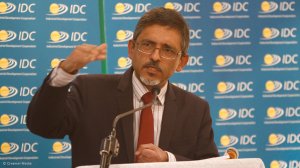The Industrial Development Corporation (IDC) has officially started to publish, on its website, the identities of all of its clients, including those officially identified as politically exposed people (PEPs). This disclosure affects all of the State-owned development finance institution’s funding recipients since April 1 this year, with the list having been published for the first time as from June.
The list will be updated every quarter and can be found under the heading 'Disclosure of IDC funded business partners' in the publications section of group's website (https://www.idc.co.za/home/financial-results/documents.html).
Economic Development Minister Ebrahim Patel, who announced the initiative in his Budget Vote address earlier this year, indicated on Monday that the decision to disclose the names of IDC clients had been taken in the interests of transparency at the institution, which made headlines recently for its decision to support the 2010 purchase, by the Gupta-family-linked Oakbay, of the Shiva uranium mine.
Until now, the IDC has treated the identities of its clients as confidential and has had to request the permission of its clients to release details of their activities, even for promotional reasons. Patel said client confidentiality was the norm across most financial institutions and that departing from the practice had been the subject of intense debate within the board.
“We recognise that confidentiality is an ordinary part of a banking relationship, but given the times we are living in and the fact that this is public money we need to change and say: ‘As important as confidentiality is, it is more important that we are able to demonstrate integrity and transparency in the way in which the IDC handles public money',” Patel explained at the IDC’s results on Monday.
Therefore, from April onwards, all clients, including PEPs, had to accept that the IDC would be disclosing their details. “Will some of the information sometimes prove uncomfortable? Unavoidably, that’s the nature of complex societies. But the IDC has to ensure that it’s never uncomfortable because of questions of integrity; that’s a line that mustn’t be crossed.”
In addition, IDC chairperson Busisiwe Mabuza announced that the board had decided to preclude nonexecutive directors from conducting any business with the IDC, having previously only insisted on full disclosure of interests, as well as recusal from deliberations on the transaction in question.
The moves come amid heightened concern in South Africa over the state of governance at a number of public institutions and State-owned companies, as well as against a backdrop of growing public outrage over allegations of corruption at these organisations.
CEO Geoffrey Qhena indicated that the company was aware of the scrutiny being given to the IDC’s decision to lend to Oakbay and said efforts were under way to protect its interests “as soon as possible”.
He reported that the IDC was still owed R37.5-million on the capital portion of the 2010 loan, while the outstanding interest of R257-million had been converted to equity. However, that conversion took place ahead of Oakbay’s delisting from the JSE, which had fundamentally changed the character of the holding. “Therefore, we are engaging with Oakbay on the matter,” Qhena reported, revealing that these discussion now also included board representatives.
No timeframe had been set for resolution but Qhena said it was a priority for the board, which would have preferred for the matter to have been resolved “like yesterday”.
EMAIL THIS ARTICLE SAVE THIS ARTICLE ARTICLE ENQUIRY FEEDBACK
To subscribe email subscriptions@creamermedia.co.za or click here
To advertise email advertising@creamermedia.co.za or click here










